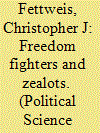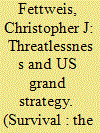|
|
|
Sort Order |
|
|
|
Items / Page
|
|
|
|
|
|
|
| Srl | Item |
| 1 |
ID:
182871


|
|
|
|
|
| Summary/Abstract |
CHRISTOPHER J. FETTWEIS discusses what political polarization in the United States has in common with the relationship between the Cold War superpowers. He argues that in both cases the “enemy image” warps perception of the other side and prevents meaningful reconciliation. Applying insight from international relations to U.S. domestic politics, he discusses the pernicious effects of the enemy image and how to overcome it.
|
|
|
|
|
|
|
|
|
|
|
|
|
|
|
|
| 2 |
ID:
135339


|
|
|
|
|
| Summary/Abstract |
Anarchy was coming to Africa, Robert Kaplan warned in 1994, and a surge in conflict initially seemed to confirm that prediction. With less fanfare, however, after the year 2000, conflict in Africa declined, probably to the lowest levels ever. Recent fighting in Libya, Mali, South Sudan and elsewhere has prompted a new wave of ‘Africa falling apart’ concerns. This article reviews the history and data of conflict in Africa, from pre-colonial times to the present. Historical comparison and quantitative analysis based on the Uppsala Conflict Data Program (UCDP) and Major Episodes of Political Violence (MEPV) datasets on the 1961–2013 period show that Africa has experienced a remarkable decline in warfare, whether measured in number of conflicts or fatalities. Warfare is a relatively low risk to the lives of most Africans. The years 2010–2013 saw an increase of 35 per cent in African battle deaths over 2005–2010, but they still are 87 per cent lower than the 1990–1999 average. Changes in external support and intervention, and the spread of global norms regarding armed conflict, have been most decisive in reducing the levels of warfare in the continent. Consequently, there is no Africa exception to the systemic shift towards lower levels of armed conflict.
|
|
|
|
|
|
|
|
|
|
|
|
|
|
|
|
| 3 |
ID:
089722


|
|
|
| 4 |
ID:
052893


|
|
|
| 5 |
ID:
107577


|
|
|
|
|
| Publication |
2011.
|
| Summary/Abstract |
The major U.S. allies seem to be content to let the United States shoulder the burden associated with assuring the security of the West and promoting freedom and democracy around the world, passively free riding on the security provided by the U.S. taxpayer. A different explanation is available, if rarely discussed: Perhaps the Europeans great powers are not merely passive consumers of free U.S. security guarantees; perhaps instead the decisions they have made with regard to their own defense are part of active, coherent, logical, rational grand strategies. Perhaps the choice to pursue strategic restraint is not due to the stability provided by U.S. hegemony but a conscious response to declining threat. This article seeks to explain the grand strategies of some of the great and potentially great powers of the post-Cold War world. Far from being irresponsible international actors, our allies are acting quite rationally in a world virtually absent of serious threat, at least compared to all those that have come before.
|
|
|
|
|
|
|
|
|
|
|
|
|
|
|
|
| 6 |
ID:
089339


|
|
|
|
|
| Publication |
2009.
|
| Summary/Abstract |
Christopher J. Fettweis argues that too many post-September 11 analyses of terrorism seem to regard the phenomenon as brand new. Terrorism has existed throughout history, and its groups come in two forms: nationalist and ideological. This simple binary typology illuminates a number of important characteristics of terrorism, from group strategy and tactics to overall life expectancy. Perhaps most important, counter-terrorism measures that prove effective against groups in one category will often fail against those in the other.
|
|
|
|
|
|
|
|
|
|
|
|
|
|
|
|
| 7 |
ID:
089420


|
|
|
|
|
| Publication |
2009.
|
| Summary/Abstract |
Christopher J. Fettweis argues that too many post-September 11 analyses of terrorism seem to regard the phenomenon as brand new. Terrorism has existed throughout history, and its groups come in two forms: nationalist and ideological. This simple binary typology illuminates a number of important characteristics of terrorism, from group strategy and tactics to overall life expectancy. Perhaps most important, counter-terrorism measures that prove effective against groups in one category will often fail against those in the other.
|
|
|
|
|
|
|
|
|
|
|
|
|
|
|
|
| 8 |
ID:
176528


|
|
|
|
|
| Summary/Abstract |
Trump’s accidental presidency is an ideal test of the strength and robustness of the international-relations canon.
|
|
|
|
|
|
|
|
|
|
|
|
|
|
|
|
| 9 |
ID:
141122


|
|
|
|
|
| Summary/Abstract |
In Russia’s strongman president, Chinese autocrats and Iranian clerics, Western leaders face an age-old problem, one that has vexed nearly every leader throughout history: seemingly inscrutable rivals. How much of what others say is the truth, and how much is designed to hide a broader agenda? Can they be trusted? Since leaders never really know just how much danger they face – or where to draw the line between prudence and paranoia – they tend to err on the side of caution. The tendency to assume the worst in others seems to be the rule, rather than the exception, in international politics.
|
|
|
|
|
|
|
|
|
|
|
|
|
|
|
|
| 10 |
ID:
143251


|
|
|
|
|
| Summary/Abstract |
Every few years, scholars and strategists rediscover the importance of geography. Interest in the terrestrial setting of international politics has grown again in the last few years, with classical geopolitics, in particular, receiving a fresh look from a variety of angles. Scholars, journalists and strategists have abetted geography's “revenge” against perceptions of obsolescence in the face of changing technology.1 This article discusses this most recent regeneration, evaluating the descriptive, predictive and prescriptive contributions of classical geopolitics, from Kjellen to Kaplan, in order to help determine whether the revival is to be welcomed.
|
|
|
|
|
|
|
|
|
|
|
|
|
|
|
|
| 11 |
ID:
079995


|
|
|
| 12 |
ID:
160915


|
|
|
|
|
| Summary/Abstract |
His eponymous wall notwithstanding, Hadrian was a prudent realist who put reason ahead of fear and interest ahead of glory.
|
|
|
|
|
|
|
|
|
|
|
|
|
|
|
|
| 13 |
ID:
138598


|
|
|
|
|
| Summary/Abstract |
As the Soviet Union was in the process of collapsing, Georgi Arbatov sent a letter to the New York Times that contained a warning for the United States. Arbatov, who was one of the Kremlin’s leading ‘Amerikanists’, wrote that the Soviets were unleashing a ‘secret weapon’, one ‘that will work almost regardless of the American response’. It was not the stuff of Cold War
nightmares, some sort of last-minute deus ex machina from the Academy of Sciences that would rescue the Soviet Union from oblivion. No, in this instance, the weapon was psychological and unequivocal: the Kremlin was about to deprive America of the Enemy.
|
|
|
|
|
|
|
|
|
|
|
|
|
|
|
|
| 14 |
ID:
153177


|
|
|
|
|
| Summary/Abstract |
Despite a few persistent, high-profile conflicts in the Middle East, the world is experiencing an era of unprecedented peace and stability. Many scholars have offered explanations for this “New Peace,” to borrow Steven Pinker's phrase, but few have devoted much time to the possibility that US hegemony has brought stability to the system. This paper examines the theoretical, empirical, and psychological foundations of the hegemonic-stability explanation for the decline in armed conflict. Those foundations are rather thin, as it turns out, and a review of relevant insights from political psychology suggests that unipolarity and stability are probably epiphenomenal. The New Peace can in all likelihood continue without US dominance and should persist long after unipolarity comes to an end.
|
|
|
|
|
|
|
|
|
|
|
|
|
|
|
|
|
|
|
|
|